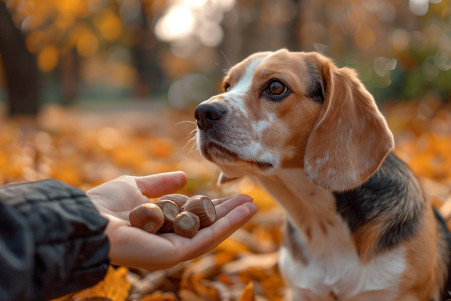Can Dogs Eat Water Chestnuts? Safe Snacking for Your Pup Explained
24 February 2024 • Updated 24 February 2024

Your dog is looking for a snack and you know they love something with a crunch, but you’re not sure if water chestnuts are a good option.
The good news is that dogs can eat water chestnuts, and they can even be a healthy treat for your pup because they are non-toxic and have a high water content.
That said, you will need to make sure to prepare them properly by peeling and cutting them into small, bite-sized pieces to avoid a choking hazard. You’ll also want to make sure that you aren’t feeding your dog canned water chestnuts, as they can contain added sodium and preservatives.
Our complete investigation below breaks down what this means in practice, using veterinary input and nutritional research to cover everything you need to know about giving your dog water chestnuts.
Our conclusions are based on a compilation of research on animal nutrition, toxicology, and other relevant topics, and our goal is to give you a comprehensive understanding of where water chestnuts fit into your dog’s diet so that you can make the best choices when it comes to your dog’s treats.
Can dogs eat water chestnuts?
Nutritional Benefits of Water Chestnuts for Dogs
Water chestnuts can definitely be a healthy treat for dogs. They have some nutrients that can be a good addition to a dog’s diet.
According to Verywell Fit, a small serving for a dog, which is four raw water chestnuts, has 1.1 grams of dietary fiber and a good amount of potassium. Fiber is important for digestion and regular bowel movements, and potassium is important for nerve and muscle function, so both are good for dogs.
Healthline says that the antioxidants in water chestnuts can help fight inflammation and repair cells, so they are even healthier than you might think. That said, because of the starch content, it’s important to make sure that dogs only eat water chestnuts in moderation so that they are a treat and not a main part of their diet.
It’s also important to note that there is a big difference in the nutritional content of raw and canned water chestnuts. Verywell Fit also says that canned water chestnuts often have added salt, which is not good for dogs.
To avoid unnecessary additives and make sure that they stay as nutritious as possible, make sure to buy raw water chestnuts and keep them in the refrigerator. To make sure that water chestnuts are safe for dogs to eat and to avoid parasites, it’s important to peel and wash them thoroughly before giving them to your dog.
Dog Digestion and New Foods
If you’re thinking about adding water chestnuts to your dog’s diet, it’s important to consider how the canine digestive system works. While dogs are omnivores and their digestive systems are designed to handle a variety of foods, new foods can still cause problems.
This is because the body is constantly working to maintain a delicate balance between the food that is consumed and the nutrients that are created from it. Sudden changes can throw this balance off and lead to issues like vomiting and diarrhea.
To avoid this, the American Kennel Club (AKC) suggests gradually introducing new foods like water chestnuts. This means starting with a small amount mixed with your dog’s regular food and slowly increasing the amount over the course of a few days.
Fiber is a big part of this process. While there are many fiber benefits for dogs, including helping with digestion and regulating bowel movements, the Washington State University Veterinary Teaching Hospital explains that too much new fiber can lead to gastrointestinal upset.
As a result, it’s important to make sure you’re feeding your dog water chestnuts in moderation and watching them closely for any signs of trouble. This way, you can make sure you’re not overloading them with a new fiber source.
In addition, make sure you’re watching your dog for signs of an adverse reaction and keeping the portion sizes small. Finally, consider your dog’s individual digestive issues to make sure you’re adding water chestnuts to their diet in a way that is safe and healthy.
What Fruits and Vegetables Can Dogs Eat?
Apples, bananas, blueberries, carrots, cucumbers, green beans, and peas are all examples of fruits and vegetables that are good for dogs, according to the American Kennel Club. These foods are full of vitamins, minerals, and antioxidants, all of which can be beneficial when given in the right portions and in the right way.
That said, there are also fruits and vegetables that are toxic to dogs. Avocado contains persin, grapes and raisins can lead to kidney failure, and the green parts of tomatoes contain solanine; all of these things are poisonous to dogs, according to WebMD and the American Kennel Club.
Water chestnuts, which are low in calories and high in water content, as well as potassium and fiber, are a good example of a non-traditional option that is safe for dogs.
However, like all fruits and vegetables, water chestnuts should be given in moderation—treats should make up no more than 10% of your dog’s daily caloric intake, according to RAWZ.
When you’re introducing new treats like water chestnuts, it’s important to do so slowly and to make sure they’re prepared properly by removing any inedible parts.
Risks of Feeding Your Dog Water Chestnuts
While water chestnuts can be a healthy addition to your dog’s diet, there are some risks to be aware of. One suggestion from Safari Veterinary Care Centers is to make sure you remove the hard, non-digestible skin from the water chestnuts before feeding them to your dog. In addition, make sure to cut the water chestnuts into small pieces that are appropriate for your dog’s size to avoid choking hazards.
DogTime warns that canned water chestnuts are not safe for dogs due to their high sodium levels and preservatives. In fact, canned water chestnuts can be toxic to dogs. Fresh, peeled water chestnuts can be fed to dogs in moderation, but their high starch and fiber content should be taken into consideration.
If your dog shows any signs of an allergic reaction to water chestnuts, such as coughing, gagging, or digestive upset, it’s important to get them to the vet right away.
As suggested by MasterClass, make sure to monitor your dog closely when introducing a new food and contact your vet if you notice any concerning symptoms. And as always, while water chestnuts can be a healthy treat for your dog, they should never replace your dog’s regular, well-balanced diet.
Final Thoughts: Can Dogs Have Water Chestnuts?
In summary, dogs can have water chestnuts as long as they are given in moderation and prepared properly. One thing from Safari Veterinary Care Centers notes that water chestnuts are full of nutrients such as potassium and copper, which help maintain heart and bone health. However, in order to make sure that these treats are safe and healthy, they need to be peeled and cut to avoid choking.
It’s all about moderation. Like all treats, water chestnuts should not be used to replace your dog’s regular diet but to supplement it. While they are low in fat, their fiber and starch content mean that they should be given in moderation to avoid stomach issues according to DogTime.
It’s always a good idea to talk to your vet before adding new foods to your dog’s diet to make sure that they are in line with your dog’s specific dietary needs.
Treats like water chestnuts can help add some variety to your dog’s diet and can help make sure that they are getting the nutrients that they need. Just remember that the right treats in the right amounts can help make your dog’s life better while keeping them healthy and happy.


